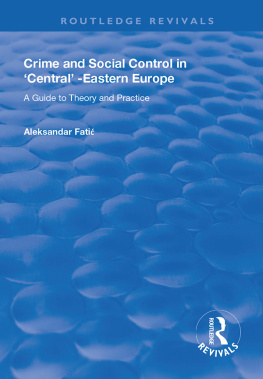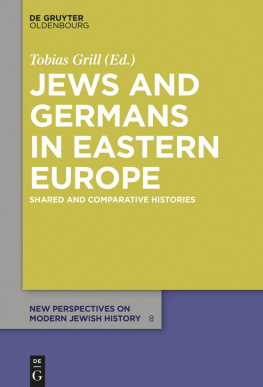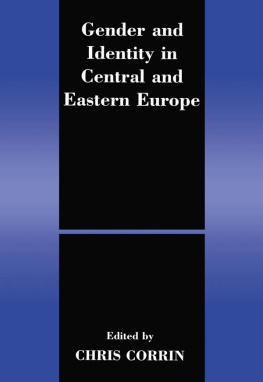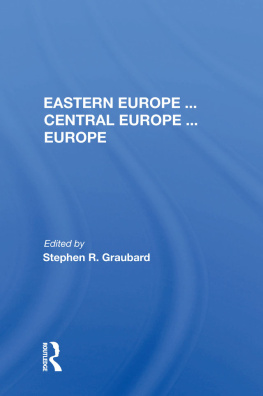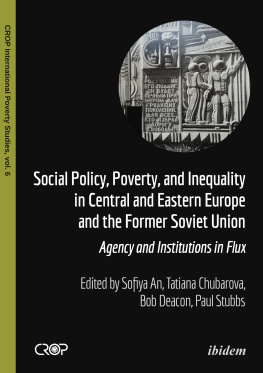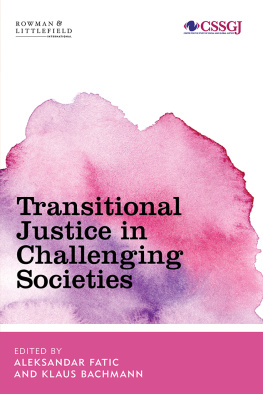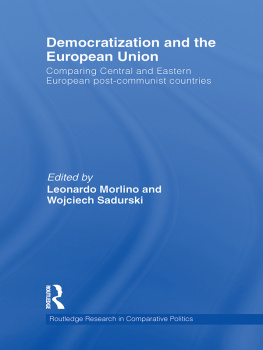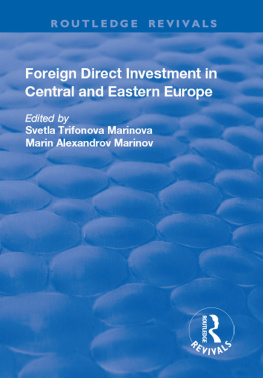CRIME AND SOCIAL CONTROL IN CENTRAL-EASTERN EUROPE; A GUIDE TO THEORY AND PRACTICE
First published 1997 by Ashgate Publishing
Reissued 2018 by Routledge
2 Park Square, Milton Park, Abingdon, Oxon OX14 4RN
711 Third Avenue, New York, NY 10017, USA
Routledge is an imprint imprint of the Taylor & Francis Group, an informa business
Copyright Aleksandar Fati 1997
All rights reserved. No part of this book may be reprinted or reproduced or utilised in any form or by any electronic, mechanical, or other means, now known or hereafter invented, including photocopying and recording, or in any information storage or retrieval system, without permission in writing from the publishers.
Notice:
Product or corporate names may be trademarks or registered trademarks, and are used only for identification and explanation without intent to infringe.
Publishers Note
The publisher has gone to great lengths to ensure the quality of this reprint but points out that some imperfections in the original copies may be apparent.
Disclaimer
The publisher has made every effort to trace copyright holders and welcomes correspondence from those they have been unable to contact.
A Library of Congress record exists under LC control number: 97074441
ISBN 13: 978-1-138-61156-6 (hbk)
ISBN 13: 978-0-429-46359-4 (ebk)
In the mid-1980s, the Hungarian-born legal theorist R.N. Berki addressed the dominant, liberal tradition in political theory and the theoretical interpretation of law, in the proposition that the famous phrase law and order is a conjunction of two terms that explain the law on two different conceptual levels. According to Berki, law and order are not two things, one of which is the end and the other the means for the accomplishment of that end. Order is not merely something that is achievable by law. More precisely, there is also a braver interpretation, according to which a certain socio-political order is also, in an essential sense, a presupposition and a source of law. Only by accepting a certain moral and cultural order, constituted by a certain order of values, the law becomes possible as a normative framework within which the relationships of legitimate mutual expectations between members of society are constituted, and which gives meaning to what is these days increasingly called the social capital of trust in the institutions.
In this context, the question of social order or rgime is an essential presupposition for a meaningful discussion of any set of specific problems of social policy, including the problem of internal security, which is the traditional subject of criminal policy. Berkis position is based on the notion that the social order is constituted only through and on the basis of an appropriate structural order of the state and of political organisation.
The relevance of the idea of an essential relationship between the political and ideological structure of a social system and the state of criminality is clear in central-eastern European societies in the period of post-communism. This period is marked by the so-called transition from socialist-communist towards liberal-capitalist forms of socio-political organisation. The analysis of criminal policy and its connections with socio-political and ideological foundations of the system in three representative countries of the region is the subject of much of this book. This analysis should illuminate some aspects of the role of ideology and the state in the constitution of the internal security crisis, as well as the social responses to that crisis through criminal policy.
The most important intention of this book is to determine the role of the community and its consensus about dominant social values within the context of questions about the constitution of legitimacy of social control. This is attempted primarily in the framework of political and social changes in the post-1989 central-eastern European countries. In most of the literature, 1989 is usually taken as the official beginning of the political transition of the region, because of the famous November 1989 events in Prague which were later called The Velvet Revolution, and similar events and developments in other countries of the region Hungary and Poland. This transition has dramatically different appearances in various parts of central-eastern Europe. In central Europe, generally speaking, it was and is being conducted in an orderly and clean manner, along with a systematic deprivation which remains the price of systemic and ideological change. In other countries, such as the former Yugoslavia and the former Soviet Union, it had the form of chaos and disintegration.
The general motivation for the exploration of changes in criminal policy is usually an impression, or a conviction, that there are reasons to doubt the effectiveness of the existing arrangements and institutions of social control. This conviction is certainly present in central-eastern Europe at the end of this century, and it is reflected in the concentrated public debate on issues of crime control. The consequences of the widespread perception of a security crisis include both social disruptions and considerable changes to the value and role of the community in the constitution of feelings of trust in the law and the legal institutions of social control. The debate itself has led to major changes in criminal legislation all countries are striving to streamline their legislation with that of the European Union member countries, and thus in much of the region criminal laws have undergone, or are undergoing, very significant technical and essential changes.
It is often argued that the rise in criminality is a sign of backsliding of social relationships, and that particularly severe and intrusive forms of crime control are a sign of the impotence of social institutions to resist that backsliding adequately and productively. The decay in social relationships and trust is assumed to constitute the specifically social dimensions of criminality. If this assumption is correct, then it is probably also correct to conclude that the social tissue in post-communist central-eastern European countries is extremely threatened today.
Along with the advent of the ideal of the international liberal state in central-eastern Europe and the universalist aspirations of the political world of the 1990s, international crime, terrorism, drug-trafficking, money-laundering, industrial espionage, and mass fraud are also on the rise.
On the one hand, these violent types of criminality in the overall amount probably do not cause such global damages, and do not lead to such global security crises, as do international terrorism or organised narcotics-trafficking. On the other hand, they directly reflect the damages to social fabric that characterise many contemporary societies. By generating an intensive fear in the population, they contribute to the erosion of trust in the ability of the criminal justice system to offer adequate protection. This is precisely why violent crime, traditionally seen as an internal or domestic type of criminality (terrorism or drug-trafficking can be seen in some way as international), worries the populations of democratic societies most of all, and induces them increasingly to opt for strategies of repressive dealing with criminally deviant individuals and groups. This sort of discourse of political legitimation is reflected today in the popular initiatives in many countries for the introduction or reintroduction of the death penalty, for increased use of life imprisonment, and for other Draconian penal responses to criminality.
The populations of central and eastern European countries, after the disintegration of the Soviet Union which provided the ideological umbrella for the former systems in the region, are no less caught by this tide of worry about the questions of security and social control policy, particularly regarding criminal policy. Their recently liberalised societies are experiencing changes which are fully representative of the well-known phenomena of security crises in advanced liberal systems, but are also, in important aspects, a novelty for societies once governed by an ideology and a Party that maintained a firm direction of control. These societies are not used to high rates of irrational individual crimes, such as the so-called serial murders, or highly organised drug-trading or money-laundering chains. The rebellion against the security crisis is loud, and the confusion is even greater. What Emil Durkheim called anomie, a lack of clear social norms or a mutual clash of norms, is an overwhelming reality in the post-communist world. Criminology and criminal law, like elsewhere in the world, seem unable to offer a quick and conclusive answer to this confusion and to the questions that arise from it. Part of the reason for this is in the very structure of the transition of post-communist societies, and particularly of those in central Europe. The silence of criminology and criminal law is greater and deeper where the emphasis of explanatory efforts is not on the questions of social justice and possibilities for a benevolent and minimally intrusive social control, but almost entirely, and almost only, on economic questions. The latter relate to conditions for a stable influx of capital and foreign investments, penetration into the foreign markets in western Europe and Asia, liberalisation of trade and other economic aspects of the legislation, harmonisation of the taxation system with the systems of the closest western markets (for central Europe, this refers mainly to the European Union market), etc.

